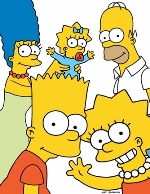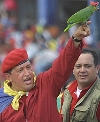RCTV journalist stabbed to death in Venezuela
Javier García, anchor journalist for the Caracas-based television station Radio Caracas Television Internacional (RCTV), was found dead in his Caracas apartment on Sunday.
Read more here
Javier García, anchor journalist for the Caracas-based television station Radio Caracas Television Internacional (RCTV), was found dead in his Caracas apartment on Sunday.
Read more here
 The Simpsons has been taken off Venezuelan television. Is this because the regime doesn’t like the programme, or because they just don’t get it, asks Daniel Duquenal
The Simpsons has been taken off Venezuelan television. Is this because the regime doesn’t like the programme, or because they just don’t get it, asks Daniel Duquenal
In the latest media silliness from Venezuela, censors have asked TV station Televen to remove the Simpsons from its late morning schedule. The organisation in charge of monitoring the quality and suitability of Venezuelan TV, CONATEL, not only told Televen to suspend the programme, but it might actually fine them: according to the law (Ley Resorte), the network should have known better.
Before I discuss this further I must state that I am not a great fan of the Simpsons and I only ever watch it for lack of anything else catching my attention. I do this through Fox, which gives me the original version, in English. But in Venezuela Fox is on cable, and from now on it seems that Simpsons fan will have to subscribe to cable if they want to keep watching their show. Through Televen they got it free; now they will have to pay for it. Cable, though, is expensive, and does not reach much more than 25 per cent of homes in Venezuela. This number has been increasing regularly since a previous fit of censorship by the Chavez administration.
Venezuelan Attorney General Luisa Ortega Díaz has been asked to investigate independent TV station Globovision, after allegations it had “undermined” President Hugo Chavez by broadcasting a news report that showed him chewing coca leaves.
Read more here

Hugo Chavez’s defeat in the recent constitutional referendum came despite massive media manipulation, writes Daniel Duquenal
On December 2 Venezuela held a referendum to modify 69 articles of its constitution. The goal was to give President Chavez the means to remain in office for as long as he could get away with. But the narrow No vote gave the Chavez administration an expiration date: 2013. The reform proposal was overtaken by secrecy and misinformation. It all started early in 2007, with the naming of a special commission sworn to secrecy in its debates.
On August 15 the president himself read the 33 first targeted articles. Public discussion was short. The campaign muddled the issues. When first polls showed a certain apprehension about the ‘reforma’ the chavismo [pro-Chavez parties] decided to make the contest a plebiscite on Chavez, with all the implications in a country where the state has developed an overwhelming media system at its service. (more…)